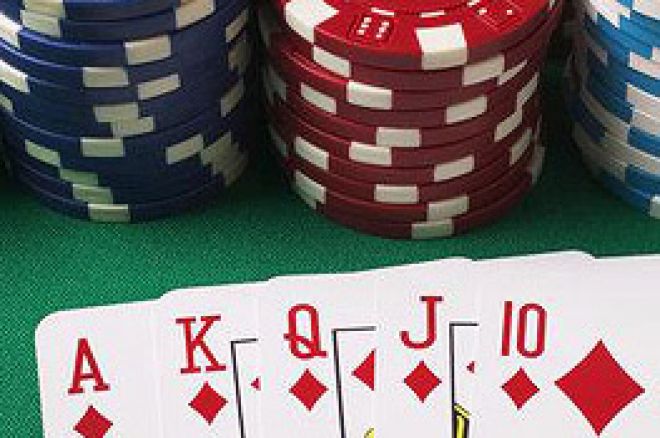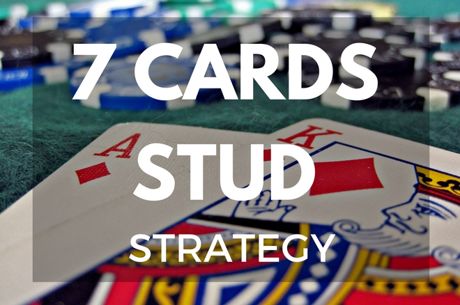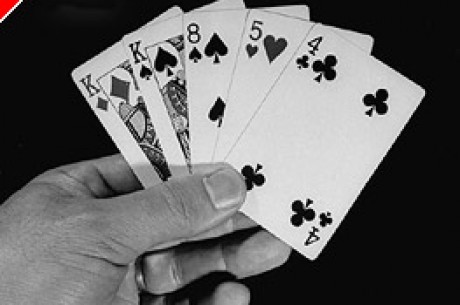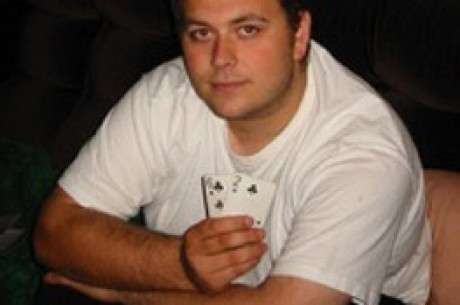Basic Stud Concepts Part I: Playing Premium Pairs

Ashley Adams has been playing poker since he learned it, literally, at his grandfather's knee 42 years ago. He's been a winning casino poker player for the past 11 years, playing primarily at Foxwoods Resort Casino but also in poker rooms all over the world. He has won at ring games and tournaments, at Stud, Stud8 and Hold Em, limit and no limit. He is the author of Winning 7-card Stud (Kensington, 2003) and over 100 articles about poker. He is due to publish Winning Baby No Limit Hold Em in 2006 and has recently been working with numerous charities on fundraising poker tournaments.
Let's start at the beginning. Well, actually, I'm assuming that you're somewhat beyond the very beginning. You know how to play 7-Card Stud, right? You understand that it's a game of skill; that players who are selective and appropriately aggressive will have a better shot at the money in the long run than those who call every bet and who never initiate the action. So let's start with what kind of hands you want to play and when you want to be aggressive with those hands.
We'll start on Third Street, the term for the first betting round when you have three cards - two down cards and one up card. Poker, like math, requires a sound foundation on which are built more advanced concepts. So let's start working on that foundation.
When you're starting out you're playing very few hands. We'll start with the very best hands and leave the more speculative hands for later, when you are better able to gauge the strength of your opponents and when you're better able to play correctly on the later streets. We're going to keep it simple so you won't have many ways of getting into trouble after Third Street.
I'm making a few presumptions about the games you'll be starting out in. These should be low stakes affairs with, generally, bad loose players. A game of rocks (very tight players) will require a somewhat modified strategy as will a table filled with loose calling stations. This is meant for something in between - where most low stakes games fall.
You're going to play very tightly at first. You're going to fold everything except trips, pairs, 3-flushes and 3-straights. And you're not going to play all of these hands either. So, just to be clear. Three non-consecutive, non-suited high cards? Fold. Ace-King suited in the hole and a small unsuited card up? Fold. 8c-9h-Jd? Fold. Fold, fold, fold, fold. It's boring much of the time but it will save you money in the long run. Just keep in mind that if you play $5/10 with a $2 bring-in and you fold 25 poor or mediocre starting hands in the course of six hours that you normally would have called thoughtlessly, that's $50 you've added to your bottom line at the end of the night. That's often the difference between a winning and a losing session.
PAIRS: Play Premium Pairs - that is 10s or higher. Raise with them unless you have reason to believe that they may not be the highest pair out. If, for example, a straightforward opponent raises with a King, fold your Jacks. If a 9 bets and is raised by a Queen and you have a pair of 10s, fold. But if a 7 bets and you have a pair of Aces raise the bet from the 7s. Similarly if a King raises and you have a pair of Aces. Get the idea?
You want to limit the field - ideally to just one other player. You do this by initiating the betting if you are the first one in or by raising someone else who has already initiated the betting. That's how you'll win the most money (at least when you're starting out and haven't learned some more subtle ways of winning money). You do not want to be deceptive. Don't try to suck people in by just calling the bet. That's called "slowplaying". There's a place for it but not here with premium pairs in this type of game. You don't want to be tricky. Just bet straightforwardly, hope that at least a few of your opponents are bad enough to call, and take their money when they do - most of the time.
Here's a sample hand for you to consider. Assume your Player D and the action has been as follows. What should you do?
$5/10 Game with a $2 forced bet from the low card.
Player A: (x-x)2c $2
Player B: ` (x-x)Jd Fold
Player C: (x-x)9s Raise to $5.00
Player D: (Kd-3c)Ks ?
Player E: (x-x)Ts
Player F: (x-x)Qd
Player G: (x-x)Jh
The answer is that you should re-raise the 9s by $5.00 to $10. Here's another example.
Player A: (x-x)2c $2
Player B: ` (x-x)6d Fold
Player C: (x-x)9s Fold
Player D: (Kd-Ks)3s
Player E: (x-x)Ts
Player F: (x-x)Qd
Player G: (x-x)Jh
Do you call the $2, fold or raise to $5?
The answer is that you raise. You raise because once again you believe that you are likely to be the highest hand out there with your pair of Kings. Do not give in to the temptation to call to try to fool people into thinking you're weak so you can suck them in and win more money from them. You don't want to risk having somebody else with a hand like a pair of tens or three to a flush or whatever to catch a great card and improve on the next card, only to stay in and beat you. Just raise, limit the field, or win the hand right then by getting everyone to fold.
Here's another example to ponder.
Player A: (x-x)2c $2
Player B: ` (x-x)6d Fold
Player C: (x-x)Qs Raise to $5
Player D: (Kd-3s)Ad ?
Player E: (x-x)Ts
Player F: (x-x)Qd
Player G: (x-x)Jh
Yes, I know it's tempting to call for $5.00 and hope to get an Ace or a King on the next hand. But that's a mistake. Just fold and wait for a better hand. True, if you knew these players really well and if you figured the guy with the Queen to be a habitual raiser and if the players after you were very weak and straightforward and likely to fold as well unless they had strong hands you might be tempted to call. But we're not playing at that level yet. We're playing straightforwardly and simply. So do the simple thing and just fold this loser.
Summary: Raise when you have a Premium Pair when you estimate it to be the best hand that is out. Don't slowplay it. Limit the field to one opponent if you can.
Please visit our online poker room directory to see the best bonuses on the web!








